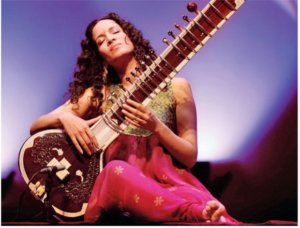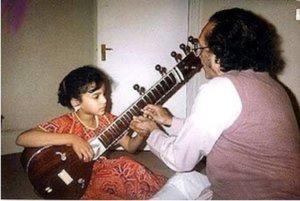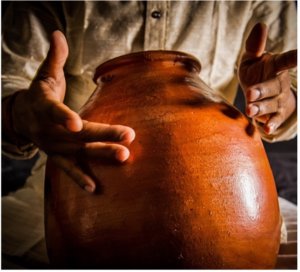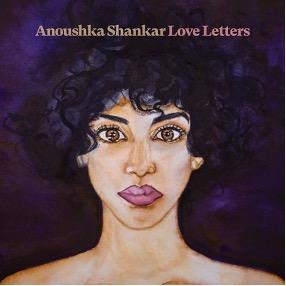By Emily O’Sullivan
 On February 16, 2021, the Institute for Global Understanding (IGU) co-sponsored the Tuesday Night World Music Record Club’s discussion of Love Letters (2020), Anoushka Shankar’s most recent release. Nominated for a Grammy in the Best Global Music Album category, the EP consists of six songs: “Bright Eyes,” “Those Words,” “Lovable,” “Space,” “Wallet,” and “In This Mouth.” Dr. Meghan Hynson, Assistant Professor of Ethnomusicology, led participants through a thoughtful discussion spanning Shankar’s musical evolution as well as the intricacies of each Love Letters track. She contributed a substantive context to every song introduced, facilitating an immersive and collaborative listening experience for all in attendance.
On February 16, 2021, the Institute for Global Understanding (IGU) co-sponsored the Tuesday Night World Music Record Club’s discussion of Love Letters (2020), Anoushka Shankar’s most recent release. Nominated for a Grammy in the Best Global Music Album category, the EP consists of six songs: “Bright Eyes,” “Those Words,” “Lovable,” “Space,” “Wallet,” and “In This Mouth.” Dr. Meghan Hynson, Assistant Professor of Ethnomusicology, led participants through a thoughtful discussion spanning Shankar’s musical evolution as well as the intricacies of each Love Letters track. She contributed a substantive context to every song introduced, facilitating an immersive and collaborative listening experience for all in attendance.
 Without question, Love Letters showcases Shankar’s mastery of the sitar. Shankar’s father, legendary Indian musician Ravi Shankar, first introduced her to the instrument at the age of seven. By the time she turned thirteen, Shankar’s professional career had taken shape and she had already performed on stage and produced an album. As her musical prowess grew increasingly evident, she opted not to attend university and instead followed in her father’s footsteps as a musical pioneer and performer of the sitar.
Without question, Love Letters showcases Shankar’s mastery of the sitar. Shankar’s father, legendary Indian musician Ravi Shankar, first introduced her to the instrument at the age of seven. By the time she turned thirteen, Shankar’s professional career had taken shape and she had already performed on stage and produced an album. As her musical prowess grew increasingly evident, she opted not to attend university and instead followed in her father’s footsteps as a musical pioneer and performer of the sitar.
Love Letters epitomizes her ingenuit y quite well, for it functions, in Dr. Hynson’s words, as a “fascinating fusion of the sitar and a number of other musical instruments.” For example, the single, “Bright Eyes” integrates the ghatam, a traditional water pot percussion instrument that is played with the mouth pressed against the player’s stomach. The player taps the surface of the ghatam with the fingers and the base of the palm and changes the pitch and resonance of the instrument by varying the pressure of the pot against the stomach. In this way, the EP incorporates a classic Indian aesthetic of sitar, ghatam, kanjira, and tanpura with modern Western pop instrumentation, to create a hybrid sound appealing to a variety of listeners.
y quite well, for it functions, in Dr. Hynson’s words, as a “fascinating fusion of the sitar and a number of other musical instruments.” For example, the single, “Bright Eyes” integrates the ghatam, a traditional water pot percussion instrument that is played with the mouth pressed against the player’s stomach. The player taps the surface of the ghatam with the fingers and the base of the palm and changes the pitch and resonance of the instrument by varying the pressure of the pot against the stomach. In this way, the EP incorporates a classic Indian aesthetic of sitar, ghatam, kanjira, and tanpura with modern Western pop instrumentation, to create a hybrid sound appealing to a variety of listeners.
 Notably, Love Letters could not exist if not for the efforts of a host of trail-blazing women. The album featured a number of female musicians and writers, as well as a female musical engineer from Brooklyn, Heba Kadry. Ayanna Witter-Johnson plays the cello on the second track, “Those Words,” and Shilpa Rao (Indian vocals), Alev Lenz, Nina Harries, and twin sisters Ibeyi are all featured vocalists on the record. Their collaboration was integral to the EP’s creation, supporting Shankar both musically and spiritually. In reflecting on the EP’s production, Shankar explained, “I really got to experience the way women show up for each other when crisis strikes. That’s really where this music came from: the shared experience of women, holding my hand and helping me find a safe place to put some of my feelings.”
Notably, Love Letters could not exist if not for the efforts of a host of trail-blazing women. The album featured a number of female musicians and writers, as well as a female musical engineer from Brooklyn, Heba Kadry. Ayanna Witter-Johnson plays the cello on the second track, “Those Words,” and Shilpa Rao (Indian vocals), Alev Lenz, Nina Harries, and twin sisters Ibeyi are all featured vocalists on the record. Their collaboration was integral to the EP’s creation, supporting Shankar both musically and spiritually. In reflecting on the EP’s production, Shankar explained, “I really got to experience the way women show up for each other when crisis strikes. That’s really where this music came from: the shared experience of women, holding my hand and helping me find a safe place to put some of my feelings.”
 Love Letters signifies a departure from Shankar’s typical releases. Indeed, according to Dr. Hynson, the EP serves as “documentation of this profound period of upheaval” in Shankar’s recent history. From health issues to divorce, Shankar has grappled with losses that transcended her personal narrative and made their way into her songwriting. As a result, Love Letters emits a rather “somber,” “introspective,” and “cathartic” tone. At the same time, Shankar was careful not to craft her songs in an idiosyncratic manner, instead aiming for lyrics equally poignant and unspecific so that listeners could interpret her music in their own way. Therefore, Love Letters embodies a journey to healing, meeting listeners exactly where they are in hopes of elevating their spirits to some better place.
Love Letters signifies a departure from Shankar’s typical releases. Indeed, according to Dr. Hynson, the EP serves as “documentation of this profound period of upheaval” in Shankar’s recent history. From health issues to divorce, Shankar has grappled with losses that transcended her personal narrative and made their way into her songwriting. As a result, Love Letters emits a rather “somber,” “introspective,” and “cathartic” tone. At the same time, Shankar was careful not to craft her songs in an idiosyncratic manner, instead aiming for lyrics equally poignant and unspecific so that listeners could interpret her music in their own way. Therefore, Love Letters embodies a journey to healing, meeting listeners exactly where they are in hopes of elevating their spirits to some better place.
Love Letters is available to stream on Apple Music, Spotify, and Shankar’s YouTube channel. To further encounter musical genius from around the world, be sure to leave your Tuesday nights open!
